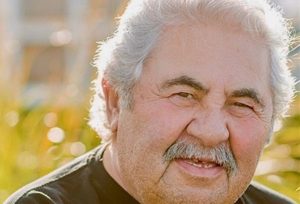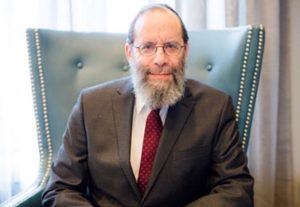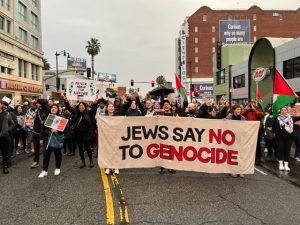DJ Schneeweiss is returning to Jerusalem in August after a four-year stint as consul general to Toronto and Western Canada. But before he transfers the reins to incoming consul general Galit Baram, we caught up with the Australian-born diplomat for a final debriefing.
Do you know what’s next? Will you stay in government?
The exact role I’m going to be filling is not yet clear. There are all sorts of possibilities.
How many nights were you home in the last four years with nothing to do – except sit back and watch TV?
[laughs] This Jewish community and the general community do a lot of work in the evening. That is obviously an outgrowth of the fact that a big organization will have a dinner in the evening but also that so many people are involved in charities on a voluntary basis, so they’re spending time outside of work hours.
It’s all about finding the balance, so even if you’re out until 8:30 p.m., you’re not out until 10:30 or 11. We did find time – although my wife might say something different – and hopefully, I found that balance.
If you had to ballpark it, how many nights would you say you were home?
It goes by seasons. In the busy season, spring and autumn, you could be out four, five nights a week. And there are some nights where you’ve got two, three different things, and you’ve got to hop from one to the other.
I don’t look at it as a burden. It’s a huge privilege to represent Israel in an environment that’s so welcoming. If the consulate is being invited to say a few words, it’s a great opportunity to communicate our story.
How do you find something new to say each time you get behind a podium?
It’s a process. The first part is representing as rich a country as Israel. The second is knowing that each audience has its own particular agenda or passion. So you bring some piece of Israel into the room, and you respect whatever the room is about. And then whatever is currently happening, the latest headlines. You try to find something that’s relevant, not banal. I try to leave people with something they can chew on.
Coming in four years ago, did you have a point of emphasis?
Knowing that Israel is relevant to many people in this town in many different ways, and not just the Jewish community, I hoped to build the kinds of platforms and interactions that would allow us to communicate relevantly. I’ve tried to convey that message in things I said and initiatives we took.
I grew up in a Jewish community not dissimilar to Toronto. I came with a relatively well-developed sense of how Israel looks from a Jewish community point of view. I wanted to make sure I kept that perspective in my own mind to understand how what we do and say can resonate.
Was there a certain area or methodology that you thought about?
My predecessor Amir Gissin spent much of his time and was well-known for promoting the branding initiative. It seems to me that we’ve gotten beyond that point where we have to talk about the branding. The brand itself is a vibrant, diverse, creative, innovative country called Israel – that brand is well-known now. Our job is not so much to say, ‘Hey look at us we’re telling our story differently.’ It’s more about realizing that story’s potential. So a lot of the focus is on pushing the R&D [research and development] relationship.
We’ve improved our interaction with the big oil companies through their consortium. What’s the point? Harnessing Israeli water technologies to the benefit of the entire oil industry.
We just had it with the Ontario Premier Kathleen Wynne’s trip to Israel. We focused on life sciences and other aspects of R&D, and one key issue is cybersecurity, in which we are literally a global leader. Surrey, B.C., has a very forward-thinking leadership. We have a real relationship, with cybersecurity as one key focus, and it’s contracts, it’s efficiencies – there are real benefits.
Has this grown in the last four years?
Definitely. The awareness has grown, the presence has grown, the traffic of senior executives has grown. It’s a big story.
We have a project in Guelph, Ont. with construction firm EllisDon where Israeli Iron Dome technology is being harnessed for a more efficient electricity smart grid. It’s still in the works – the business payday isn’t quite there yet – but there is this collaboration to find cheaper power solutions using Israeli technology developed for other purposes. The consulate doesn’t do all the work, but we’re a part of that facilitation process.
A lot of it isn’t seen. In the Jewish community, the visibility of the consulate is perhaps through our newsletter, perhaps an interview. But our work is much broader.
To be honest, the trade figures haven’t grown significantly but the businesses and institutions that came on the trip – they’re there because there’s a substance to their interaction with Israel that is meaningful and valuable to them.
Do you anticipate that the growth in trade will come?
We’re an unusual story. We’re not China; we’re not going to offer huge markets for Ontario products and sign deals worth billions of dollars. The premier came to Israel because she wanted to connect with knowledge economies. It’s not a typical exchange of trade but we’re going to collaborate in terms of R&D, science and knowledge.
Another example: University Health Network and Technion have an ongoing relationship in stem cell research. The potential when this research begins to provide medical treatment that will improve health – the value of that is still at the research stage.
But for the premier’s visit there were 44 different deals signed valued at over $180 million. For a small country like Israel that’s not a bad take-home, given there’s so much other value too.
You’re probably aware that parts of the community experience a lot of fear these days. At times, I’ve heard you try to calm these fears. Has that been your experience?
It’s certainly been my intention. My experience of this country is that it is an open, welcoming, fair-minded, decent place. The overwhelming number of people you encounter in any kind of position of authority are exactly that.
We need to be vigilant, but at the same time we have to keep perspective. This is a great place of opportunity and freedom, and it’s a secure and good place for Jews to live without having to look over their shoulders and worry.
You previously worked a lot on the BDS (Boycott, Divestment and Sanctions) file at the foreign ministry. Did you wade into BDS here?
It was certainly not my focus. As consul general, I have so much more valuable stuff to do than worry about the noise the BDS crew makes. There is a battle of ideas about Israel in some quarters, and we have to engage in that battle. But we have to be clever. When you send the premier to Israel with a massive delegation with every single participant coming back saying how they had such a phenomenal time and how it was so worthwhile, that’s got political legs that no student BDS resolution could ever dream of.
What did you know about Toronto, the rest of the country, and the Jewish community here?
I’d had some very effective dealings with the Centre for Israel and Jewish Affairs (CIJA) before coming here, so I had a good sense of the capacities of this community. Also, the Israeli foreign service – we do a pretty good of preparing our diplomats for their postings.
What struck you most once you got here?
I knew but didn’t fully grasp the breadth and depth of the volunteer dynamic here. The volunteerism that you see in this community is absolutely extraordinary across the full array of issues, not only philanthropic giving, but the amount of time people give. Also, the focus on Holocaust remembrance is extremely strong.
You’ve said a lot about what Toronto does well. What does the community need to improve?
One of the things we saw during last year’s elections, there was a little bit of that left-right divide. You don’t want one Jew to talk about another Jew just because of his different politics as if he’s an enemy. I sensed it more in 2015 than this year, though it comes up on Israel as well: a tendency to delegitimize that part of the community that is not your part or that side of the political spectrum that is not your side.
You mentioned in an initial interview that you planned to look up some old Toronto family connections. Did you manage to do that?
I did. I found a lady who has meanwhile passed away, a woman I knew from my grandmother’s letters to her mother back in the 1940s when my grandmother was here in Toronto. This woman – Eunice Moukley – as a little girl played with my mother when my mother was six years old. When my mum came and visited, they hung out together.
Do you feel more Canadian now that you’ve been here four years?
Without being rude, no. I live a totally odd life in that I’m in a country but constantly living in a different country. Here in this office I’m reading Hebrew, I’m reporting back to my head office and I’m representing Israel wherever I go. That said, we’re going to miss the Sundays and we’re going to miss the Blue Jays.
Is there anything you’re taking with you from this job?
The main thing we’ll take home is the warm embrace of the community as a whole, of the willingness to have Israel as part of their lives. That’s a real gift – to the community and for us personally. It’s very rewarding to be able to represent Israel and be a conduit for all of that passion and all of that desire to see us do well. It’s been a good time.
This interview has been edited and condensed for style and clarity.






